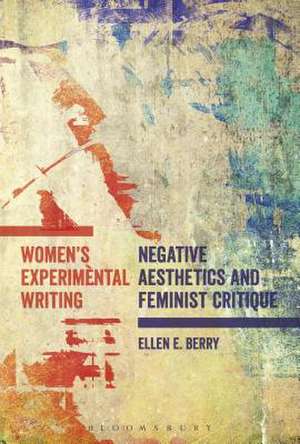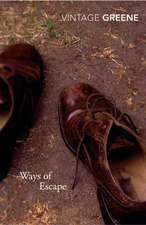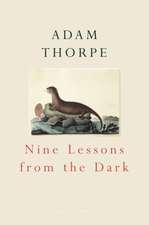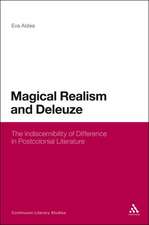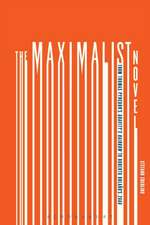Women's Experimental Writing: Negative Aesthetics and Feminist Critique
Autor Ellen E. Berryen Limba Engleză Hardback – 18 mai 2016
| Toate formatele și edițiile | Preț | Express |
|---|---|---|
| Paperback (1) | 235.83 lei 6-8 săpt. | |
| Bloomsbury Publishing – 29 noi 2017 | 235.83 lei 6-8 săpt. | |
| Hardback (1) | 713.79 lei 6-8 săpt. | |
| Bloomsbury Publishing – 18 mai 2016 | 713.79 lei 6-8 săpt. |
Preț: 713.79 lei
Preț vechi: 829.98 lei
-14% Nou
Puncte Express: 1071
Preț estimativ în valută:
136.60€ • 141.80$ • 113.90£
136.60€ • 141.80$ • 113.90£
Carte tipărită la comandă
Livrare economică 22 martie-05 aprilie
Preluare comenzi: 021 569.72.76
Specificații
ISBN-13: 9781474226400
ISBN-10: 147422640X
Pagini: 184
Dimensiuni: 156 x 234 x 13 mm
Greutate: 0.44 kg
Editura: Bloomsbury Publishing
Colecția Bloomsbury Academic
Locul publicării:London, United Kingdom
ISBN-10: 147422640X
Pagini: 184
Dimensiuni: 156 x 234 x 13 mm
Greutate: 0.44 kg
Editura: Bloomsbury Publishing
Colecția Bloomsbury Academic
Locul publicării:London, United Kingdom
Caracteristici
The book rectifies a general critical neglect of contemporary experimental writing by women, especially in its politicized forms
Notă biografică
Ellen E. Berry is Professor of English and American Culture Studies and Director of the Institute for the Study of Culture and Society at Bowling Green State University, USA. Her books include Curved Thought and Textual Wandering: Gertrude Stein's Postmodernism (1992) and (as co-author with Mikhail Epstein) Transcultural Experiments: Russian and American Models of Creative Communication (1999). She is editor of the journal Rhizomes: Cultural Studies in Emerging Knowledge.
Cuprins
Introduction Chapter One: Homicidal Feminism: Negative Aesthetics in Valerie Solanas's Scum Manifesto Chapter Two: Kathy Acker's Fatal Strategies Chapter Three: 'The Remnant Is the Whole': History, Trauma, and the Politics of Absence in Theresa Cha's Dictee Chapter Four: Abjection and the 'Monstrous Masculine' in Chantel Chawaf's Redemption Chapter Five: Suspending Gender?: The Politics of Indeterminacy in Jeanette Winterson's Written on the Body Chapter Six: Becoming-Girl/Becoming-Fly/Becoming-Imperceptible: Gothic Posthumanism in Lynda Barry's Cruddy: An Illustrated Novel Bibliography Index
Recenzii
Anyone interested in the internal variety of experimental writing by women will find Berry's book essential: the distinctions she establishes could become cornerstones for finer-grained future investigations of overall categories and individual texts.
Writing against a North American tradition that tends to categorize works as either experimental or political, Berry's monograph highlights both the aesthetic and feminist value of writing styles that make us uncomfortable-that make us experience the negative affect that they also represent ... She not only gives serious attention to a number of understudied works, but opens up a conversation between feminist political literary criticism and other criticism movements that have more explicitly embraced the negative.
[Berry's] book analyzes a myriad of diverse writers and their prose texts as they engage negative aesthetics for overtly political, dramatically feminist purposes in the United States, the United Kingdom, and France . As we learn in this book, the "negative" is not a negative term at all-certainly not for feminists or anyone who questions the false social ideologies of heterogeneity, its discourses, and its discontents. The "negative" is an aesthetic in that it is both reality and our survival strategy. It eschews political correctness, and it is a politically potent, intellectually demanding act.
The book offers some very well-organized and detailed readings.
Writing against a North American tradition that tends to categorize works as either experimental or political, Berry's monograph highlights both the aesthetic and feminist value of writing styles that make us uncomfortable-that make us experience the negative affect that they also represent ... She not only gives serious attention to a number of understudied works, but opens up a conversation between feminist political literary criticism and other criticism movements that have more explicitly embraced the negative.
[Berry's] book analyzes a myriad of diverse writers and their prose texts as they engage negative aesthetics for overtly political, dramatically feminist purposes in the United States, the United Kingdom, and France . As we learn in this book, the "negative" is not a negative term at all-certainly not for feminists or anyone who questions the false social ideologies of heterogeneity, its discourses, and its discontents. The "negative" is an aesthetic in that it is both reality and our survival strategy. It eschews political correctness, and it is a politically potent, intellectually demanding act.
The book offers some very well-organized and detailed readings.
